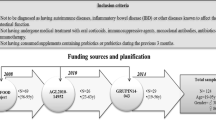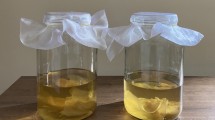Abstract
Turmeric is widely used in Indian cuisine. The main constituents of turmeric are curcumin and its analogues, which are well-known antioxidant compounds. In the present study, we hypothesized that turmeric in curry might increase bowel motility and activate hydrogen-producing bacterial flora in the colon, thereby increasing the concentration of breath hydrogen. Eight healthy subjects fasted for 12 h and ingested curry and rice with or without turmeric (turmeric knockout curry). Breath-hydrogen concentrations were analyzed every 15 min for 6 h by gas chromatography with a semiconductor detector. Curry with turmeric significantly increased the area under the curve of breath hydrogen and shortened small-bowel transit time, compared with curry not containing turmeric. These results suggested that dietary turmeric activated bowel motility and carbohydrate colonic fermentation.


Similar content being viewed by others
References
Curcuma longa (turmeric). Monograph. Altern Med Rev. 2001;(suppl):S62–S66.
Bundy R, Walker AF, Middleton RW, Booth J. Turmeric extract may improve irritable bowel syndrome symptomology in otherwise healthy adults: a pilot study. J Altern Complement Med. 2004;10:1015–1018. doi:10.1089/acm.2004.10.1015.
Aggarwal BB, Surth YJ, Shishoda S. The molecular targets and therapeutic uses of curcumin in health and diseases. In: Aggarwal BB, Surth YJ, Shishoda S, eds. Advances in Experimental Medicine and Biology. Vol 595. USA: Springer; 2007.
Ringman JM, Frautschy SA, Cole GM, Masterman DL, Cummings JL. A potential role of the curry spice curcumin in Alzheimer’s disease. Curr Alzheimer Res. 2005;2:131–136. doi:10.2174/1567205053585882.
Cruz-Correa M, Shoskes DA, Sanchez P, et al. Combination treatment with curcumin and quercetin of adenomas in familial adenomatous polyposis. Clin Gastroenterol Hepatol. 2006;4:1035–1038. doi:10.1016/j.cgh.2006.03.020.
Holt PR, Katz S, Kirshoff R. Curcumin therapy in inflammatory bowel disease: a pilot study. Dig Dis Sci. 2005;50:2191–2193. doi:10.1007/s10620-005-3032-8.
Hanai H, Iida T, Takeuchi K, Watanabe F, et al. Curcumin maintenance therapy for ulcerative colitis: randomized, multicenter, double-blind, placebo-controlled trial. Clin Gastroenterol Hepatol. 2006;4:1502–1506. doi:10.1016/j.cgh.2006.08.008.
Johnson JJ, Mukhtar H. Curcumin for chemoprevention of colon cancer. Cancer Lett. 2007;255:170–181. doi:10.1016/j.canlet.2007.03.005.
Levitt MD, Donaldson RM. Use of respiratory hydrogen (H2) excretion to detect carbohydrate malabsorption. J Lab Clin Med. 1970;75:937–945.
Simrén M, Stotzer PO. Use and abuse of hydrogen breath tests. Gut. 2006;55:297–303. doi:10.1136/gut.2005.075127.
Kamm MA, Leonnard-Jones JE, eds. Gastrointestinal Transit Time Pathophysiology and Pharmacology. Petersfield: Wrightson Biormedical Publishing Ltd; 1991.
Ohsawa I, Ishikawa M, Takahashi K, et al. Hydrogen acts as a therapeutic antioxidant by selectively reducing cytotoxic oxygen radicals. Nat Med. 2007;13:688–694. doi:10.1038/nm1577.
Hamauchi C, Takeuchi F. Nice Books 59, My Life Series Special Issue, Curry Encyclopedia. Tokyo: Graph Corp Ltd.; 2005 [in Japanese].
Read NW, Al-Janabi MN, Bates TE, et al. Interpretation of the breath hydrogen profile obtained after ingesting a solid meal containing unabsorbable carbohydrate. Gut. 1985;26:834–842. doi:10.1136/gut.26.8.834.
Kagaya M, Iwata N, Toda Y, Nakae Y, Kondo T. Small bowel transit time and colonic fermentation in young and elderly women. J Gastroenterol. 1997;32:453–456. doi:10.1007/BF02934082.
Hertz AF. The ileo-caecal sphinctor. J Physiol. 1913;47:54–56.
Douglas DM, Mann FC. The activity of the lower part of the ileum of the dog in relation to the ingestion of food. Am J Dig Dis. 1939;6:434–439.
Perman JA, Modler S. Glycoproteins as substrates for production of hydrogen and methane by colonic bacterial flora. Gastroenterology. 1982;83:388–393.
Platel K, Srinivasan K. Studies on the influence of dietary spices on food transit time in experimental rats. Nutr Res. 2001;21:1309–1314. doi:10.1016/S0271-5317(01)00331-1.
Platel K, Srinivasan K. Influence of dietary spices or their active principles on digestive enzymes of small intestinal mucosa in rats. Int J Food Sci Nutr. 1996;47:55–59. doi:10.3109/09637489609028561.
Platel K, Rao A, Saraswathi G, Srinivasan K. Digestive stimulant action of three Indian spice mixes in experimental rats. Nahrung. 2002;46:394–398. doi:10.1002/1521-3803(20021101)46:6<394::AID-FOOD394>3.0.CO;2-D.
Platel K, Srinivasan K. Influence of dietary spices and their active principles on pancreatic digestive enzymes in albino rats. Nahrung. 2000;44:42–46. doi:10.1002/(SICI)1521-3803(20000101)44:1<42::AID-FOOD42>3.0.CO;2-D.
Rasyid A, Lelo A. The effect of curcumin and placebo on human gall-bladder function: an ultrasound study. Aliment Pharmacol Ther. 1999;13:245–249. doi:10.1046/j.1365-2036.1999.00464.x.
Rasyid A, Rahman AR, Jaalam K, Lelo A. Effect of different curcumin dosages on human gall bladder. Asia Pac J Clin Nutr. 2002;11:314–318. doi:10.1046/j.1440-6047.2002.00296.x.
Chattopadhyay I, Biswas K, Bandyopadhyay U, Banerjee RK. Turmeric and curcumin: biological actions and medicinal applications. Curr Sci. 2004;87:44–53.
Venugopal P, Sudher AR. Antioxidant and anti-inflammatory properties of curcumin: the molecular targets and therapeutic uses of curcumin in health and diseases. In: Aggarwal BB, Surth YJ, Shishoda S, eds. Advances in Experimental Medicine and Biology. Vol 595. USA: Springer; 2007.
Acknowledgments
This work was supported in part by a Grant-in-Aid (16209020) for Scientific Research from the Ministry of Education, Science, Sports and Culture of Japan and Uragami Food Foundation. K. Nose is a postdoctoral fellow supported by the Japanese Promotion of Science. We thank all volunteers in this study and Ms. Noriko Inui, Ms. Azusa Hoshino, and Ms. Ayami Kayano for their technical assistance.
Author information
Authors and Affiliations
Corresponding author
Rights and permissions
About this article
Cite this article
Shimouchi, A., Nose, K., Takaoka, M. et al. Effect of Dietary Turmeric on Breath Hydrogen. Dig Dis Sci 54, 1725–1729 (2009). https://doi.org/10.1007/s10620-008-0550-1
Received:
Accepted:
Published:
Issue Date:
DOI: https://doi.org/10.1007/s10620-008-0550-1




